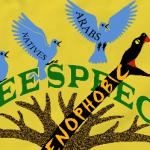I’ve encountered many a time when talking about learning different traditions and their stories the reaction of, “Its none of your business” and, “I don’t need to know what they believe”, each of these reactions are not shared by all members of their respective culture, but such sentiments are fairly common.
To this I feel taken aback and wonder at why people feel that way. Understandably minority cultures don’t want to have non-members taking their teachings and making it be marketed and mocked, in the process becoming devalued and cheapened, and eventually the mainstream culture believes that this is the way that that minority culture is. Circling back to naïve individuals from outside who wish to follow those teachings based upon the sullied version they’ve seen in the mainstream, who end up perpetuating these falsehoods and essentially are incredibly insulting to that very culture they likely genuinely would like to respect.

Mystery traditions share similar outcomes, wherein information is intentionally withheld and only revealed to the initiated and often more information comes with entering higher orders within the tradition, if they have them. So people from the outside are left to only guess, and often speculate wildly which, with nothing to counter these speculations, often becomes accepted as the truth and sticks to that tradition. Being very hard to remove these speculations from being associated with that tradition afterwords.

In both cases the conundrum goes back to how it all started – misinformation from the very beginning. And the only way such misinformation can be dispelled is by countering it with proper information – primarily from the community or spiritual leaders, but especially from journalists within.
Now, when it comes to Mystery traditions I can see how that defeats the point. But there certainly are ways to prevent this misinformation, such as showing the theme of the teachings for each category or order within the tradition – which itself would remove a lot of speculation problems. And of course just showing the point of the tradition itself to begin with – why does this tradition exist? There are already Mystery Traditions that talk to the public about these things and has helped more people reach an understanding – Wicca being a prominent one, with public outreach, such as being part of Pagan Pride Day.
 Having media outlets that are controlled by the source, such as podcasts and blog sites, increased the dispersal of accurate information that successfully counter misinformation and continues to prevent new misinformation from arising – because people finally have a primary source to refer to answer questions.
Having media outlets that are controlled by the source, such as podcasts and blog sites, increased the dispersal of accurate information that successfully counter misinformation and continues to prevent new misinformation from arising – because people finally have a primary source to refer to answer questions.
Even if we were to have all the information about these traditions and cultures be public – why bother learning them in the first place? Well, because they are part of our human story. No tradition or culture exists in isolation as they constantly influence each other all the time, so there is no point in acting like they do.
Anybody who has studied human history can attest to how cultures arise because of outside influence. The core of these cultures usually being a response to their environment, seeing cultural shifts when the environment changes – which can be summed up as a depletion or new found/arrival of resources. But for a full understanding I’ll provide a brief rundown.
How Cultures Arise From Their Environment:
Water: Determining the establishment of or relocation of settlements, or possibly innovation to continue to secure water source
Springs, Wells, Lakes, and Glaciers for water source – losing water when glacier completely melts, or when lakes fill in from ecological succession;
Larger Lakes and Rivers for drinking source and travel routes;
Deforestation leading Desertification from climate change (historically this was over geologic time instead of the rapid change we are seeing in our time – prepare for our own cultural shift!) or from over harvesting (be it logging, grazing, or crops);
Oasis discovered, creating new settlement and travel routes;
Humidity Levels – low humidity creating arid landscapes and high humidity creating tropical landscapes. Each having cultural adaptations for the different resulting weather.
Reforestation (historically from climate change – e.x. Deglaciation or Wind Current Shift bringing in moisture, again over geologic time; Migration of new plant species, often labeled today as ‘invasive’, and ecological succession into over harvested areas) with these new forests acting like a sponge, creating new springs, lakes, and recharging rivers that renews or draws in completely new occupation of the area.
Land: Either losing or gaining land for settlements and travel routes, sometimes isolating populations;
Sea level changes, Glaciers – encroaching on land/changing land shape, and thus changing access to area as it grows or melts – flooding land as it melts; Changes in river direction or volume, and flood plains.
Daylight: More daylight hours year round = higher temperatures; Less daylight hours year round = lower temperatures. Much the same occurs with altitude. Each having cultural adaptations in response to this.
Wildlife: Adapting to the behavior of wildlife in region and the kind resources that can be extracted from them. As well as their abundance or lack thereof for food and resources. Big cultural shifts resulting from new species migrating in or a species going extinct.
Domestication: Other species from immediate environment brought into cultural use and bred for traits that were desired for that culture – their utility depending on their needs as a reflection of their environment.
Minerals: Discovery of, then mined out. Completely altering the economy and society. i.e. Bronze and Iron Age; Mining towns to ghost towns.
Energy: The more power available the more resources can be harvested and manipulated into desired uses.
Hydro Power (waterwheels, dams);
Wind Power (sails, wind pumps, wind turbines);
Coal (steam engine) and Petroleum (combustion engine) – Both being byproducts of,
Solar Power (biological thermodynamics, fire, solar panels)*
Major cultural shifts when these energy sources are found or enhanced, or when the energy source is depleted (Petroleum is today’s major energy source that could run out in our lifetimes and cause a drastic cultural shift).
*Conventional wisdom states that solar power is the conversion of light into electricity, but that is ignoring a major portion of what the sun provides energy to – plants harvest the Sun‘s energy and store it in their structure which gets consumed by animals, moving that energy up the food chain. Fire is the releasing of that stored energy.

Nothing else really captures how our environment influences our culture better than the “Human Planet” documentary series by the BBC.

Closely followed by, ‘How The Earth Changed History‘ (‘How Earth Made Us’ – original title), again by the BBC, hosted by Iain Stewart.
But, the biggest catalyst to cultural development is when there is contact between different cultures – unsurprisingly, usually through Trade – bringing in new ideas and material goods that arose from their respective environments. Such as the introduction of new domestic species into a region, bringing in new resources, and the new domestic species altering the landscape.
What ever their environment has abundance of is sold and whatever their environment has little of is bought from the other culture. Through this contact there is a sudden surge of creative expression and invention. Most of humanity’s greatest inventions arose directly from major trading centers – where new ideas were welcomed because it helped their people prosper.
Our species in today’s time has in no other time before had so much information at it’s finger tips. And all this information is a culmination of the information already previously shared and developed by the people before us. And again, primarily those from our central trade areas. We stand on a mountain of knowledge that was built up, stone by stone, of what those before us had shared from their various cultures.
Our numbers – Hindu–Arabic. Our Letters – Roman. Our Maths – Babylonian and Egyptian. Our paper – Chinese. Our Glass – Syrian, Mesopotamian and ancient Egyptian. Our Silk – Chinese. Our Cotton – Pakistan and northwestern Indian. Our Vanilla – Mexican. Our Cocoa (aka chocolate) – Colombian and Venezuelan. Our Tea – Chinese. A lot of things we take for granted in our daily lives is the result of the sharing of our cultural goods. We’d all be poorer without that.

Throughout history, there has been no single culture that has stayed “pure” nor will there ever be such a culture, and it is willful ignorance to believe so. So it is counter productive to try to prevent cultural mixing.To take the time to learn about the cultures and stories of cultures other than your own is to respect our shared humanity and earth and to continue in that shared story and home. To ignore the various cultures around us is to ignore our humanity. And to the greatest extent – it causes wars.
This is why I am taken aback by the reactions I started this writing with. By choosing to be willfully ignorant of other cultures enables the inevitability of misunderstandings, which leads to stereotyping, which leads to racism, which can lead to systemic racism and genocides.

History shows this time and time again. And we shouldn’t allow this part of our history to repeat itself. That is why I am a strong advocate of mandatory world religions and world history classes in our education system. If done right, it can open our understanding of our shared humanity. People are people are people. And as I’ve pointed out earlier, our differences are simply a reflection of where we lived. And because we are now a global economy, we are now more than ever before able to have contact with cultures from all the environments our planet has to offer. But, this opportunity to share and innovate for the betterment of all is squandered by our willful ignorance of the cultures of our fellow humans.
Now, I am not saying that all cultures should be regarded as wholly good. All cultures always have room for improvement, and the way we can improve is by sharing what each has learned on what helps people prosper. But in order to move forward we must acknowledge that we’ve all made failures.
A particular failure is with “progress”, as progress doesn’t always mean the same thing to everybody. Most of the time when “progress” is touted it willfully dismisses other cultures as being “backward” and that their own is best. Sadly this disregards the wisdom of how to live with respect to the local environment. Leading to structures that originally came from different climates being plopped down in an environment it is not suited for, making things worse. So no, I am not advocating for progress but for open engagement with one another in a respectful way, in mutual aid.

Its one thing to share and trade, but its a whole other thing if a culture pressures other cultures into becoming like their own. As we’ve seen in history and in our current time, and more than likely in our future, when this is done it causes conflict in which the forced culture logically doesn’t trust the domineering one. And the domineering one, being willfully ignorant of the worldviews of the minority culture, is distrustful of it because it doesn’t understand it – stereotyping the elements that their culture finds uncouth through that misunderstanding.
If left without making amends, this distrust can fester and breed an ideology of hate from both sides, feeding into a call to force the culture that has affronted them to their knees. This kind of reaction is one of a neglected relationship with the sense of no way out. In other words, to suppress the moderate is to feed the extreme. Just because one culture may not agree with the views of the other, doesn’t mean that the other culture’s right to practice their beliefs should be denied. When this basic right is denied, the worst form of its expression is developed instead as a response against an opposing force – be it actual or perceived. “We cannot make a living because of how we look”, “They are hurting our family values.”
But it is just as bad if a culture isolates itself. This goes back to what I talked about earlier – misinformation causing strife. When a culture refuses to engage with other cultures, it leaves other cultures in the dark, wondering if this culture would be beneficial or detrimental to theirs. And the same thing happens to those in isolation. Misinformation leads to Misunderstandings, and Misunderstandings leads to Distrust, and Distrust leads to Violence.
Now, some reading this may think I am talking about a particular culture(s). I am not. Virtually all cultures past and present have had this ugly side manifest itself. And if you don’t believe me, take the time to study the history of each culture, I’m sure you’ll change your mind.
But, even with such a turbulent shared history, we’ve some how managed to succeed in reaching out to each other all over the world. We can instantly share pictures on mobile devices that some how universally speak past cultural differences and reach a common shared emotion.


We are a human family, and like any family, we have our quirky differences that the other siblings find odd, and sometimes even off-putting, but we are still family and share common interests. We all want a good life and when one of us stumbles into hard times, the rest of our family is eager to pick them up. Even if the sibling insists that they are fine and capable on their own. That is the side of humanity I see when natural disasters strike – everyone rushes to send aid as best as they are able. As a species, we obviously care for one another.
Unfortunately events of recent times, stemming from conflicts in Syria, have fed into distrust, and thus fear, and thus hatred, and sadly violence. All because of the breeding mistrust through its government practices. We tend to think that that sort of thing is from else where, not like us. But that is sadly a view held by those who are privileged in their respective society. Systemic racism is common in the vast majority of places on earth still.
The Black Lives Matter movement is a response to that in North America, First Nations / Native Americans are in the same situation. The equivalent in Europe is with the Romani, and in Australia, the Aborigine.
There have been some improvements but it isn’t enough. Until we share the same access and same rights, more work needs to be done. Otherwise, what has happened in Syria, can happen here. Likely not in the same extent because how much of an unbalance there is in terms of resources to stand up against atrocities committed – and how much those from outside are willing to supply such a conflict. Which when you look at it closely, is incredibly hypocritical, as the Syrian conflict was supplied by American interests.
Any civil minded person just wants the violence to stop, and wants every child, from every background, an opportunity for a good life. If you find yourself getting riled up and demanding sanctions against cultures other than your own – ask yourself where that is coming from? I can guarantee it is from mistrust. For that I prescribe a healthy dose of cultural education – learn the history of that culture, and mentally place yourself in their situation. Imagine yourself born in that place and time, would you behave any differently? I guarantee you that it isn’t the culture but the circumstance.
People are people are people. We all share the same basic desire, and it is up to each of us to look for that common ground and build bridges, not war. Every person born into this world deserves a chance at a good life. And if their life has led to an adulthood of destruction – seek out its origin and help that person heal from the wounds of broken relationships. You do not get to Peace with violence. You get to Peace with Peace. As Violence only begets more Violence.
You will find that the most peaceful places are the places that don’t condone violence to reach an end. The most peaceful places are the places that pick each other up and love each other for our differences.
All humanity are my brothers and sisters, and if one of my siblings is hurting another, then as a family we aught to together condemn that behavior and set the quarreling sibling right – not through isolating them from the rest of the family, like what prison does – which breeds bitterness and resentment, but by making amends. By giving opportunity for recompense, and by supporting (what my Anishinaabe side refers to as) a healing journey. That is why I like to think of “making amends” as “mend the wound.”
What our differences are pale in comparison to our similarities. That is what we should have in mind when we encounter one of our differences. The more we learn about our differences the more we see our commonalities. And with that the more capable we are to understand and thus help one another. That is why we should all take the time to learn each culture’s stories, because they are part of Our Human Story.

















